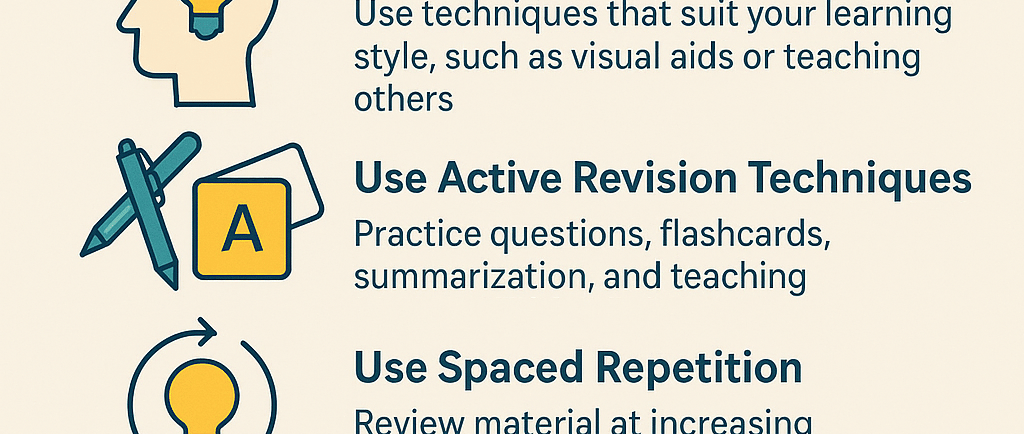How to Build an Effective Revision Strategy


Revision is a crucial part of academic success. It helps reinforce learning, identify gaps in knowledge, and boost confidence before exams. However, many students struggle with revision due to poor planning or ineffective methods. Building a strong revision strategy can make a significant difference in performance. Here’s how you can create an effective revision strategy in a structured and manageable way.
1.Start Early and Plan Ahead
The most effective revision begins well before the exam date. Cramming at the last minute may provide short-term memory boosts but rarely leads to deep understanding. Start by identifying your exam dates and creating a revision timetable. Allocate time blocks for each subject and break them down into manageable topics. Use a calendar or planner to schedule these sessions and stick to it as closely as possible.
2.Know Your Learning Style
Understanding how you learn best can significantly improve your revision. Are you a visual learner who benefits from diagrams and charts? Do you learn better by listening to audio, or by teaching someone else? Use techniques that suit your learning style. For example, visual learners might use mind maps and color-coded notes, while auditory learners might record themselves reading out notes and play them back.
3.Use Active Revision Techniques
Passive reading is not enough. Active revision techniques enhance memory and understanding. Some of the most effective methods include:
Practice Questions: Solve past papers and sample questions. This simulates exam conditions and helps identify weak areas.
Flashcards: Use flashcards for quick recall of key concepts, dates, or definitions.
Summarization: Rewrite notes in your own words to improve understanding.
Teach Someone Else: Explaining a topic to someone else is a powerful way to reinforce your knowledge.
4.Use Spaced Repetition
Spaced repetition is a scientifically proven method to improve long-term retention. Instead of revising one topic repeatedly in a single session, review it several times over days or weeks. Apps like Anki or Quizlet can help automate this process using algorithms to prompt review at optimal intervals.
5.Take Breaks and Rest
Effective revision isn’t about studying non-stop. The brain needs rest to consolidate learning. Use techniques like the Pomodoro Method—25 minutes of focused study followed by a 5-minute break. Also, make sure to get enough sleep, especially before exams, as rest strengthens memory and cognitive function.
6.Stay Organised and Track Progress
Keep your study area tidy and free from distractions. Organize notes, textbooks, and digital files for quick access. Track your progress regularly—check off completed topics and adjust your timetable if needed.
7.Stay Positive and Manage Stress
A positive mindset and stress management are key to effective revision. Don’t panic if you feel behind. Stay calm, focus on what you can do today, and take care of your mental health through relaxation techniques or light physical activity.
Conclusion
An effective revision strategy is not just about studying hard, but studying smart. By starting early, using active methods, spacing your study, and taking care of your health, you can greatly improve your academic performance and enter exams with confidence.
